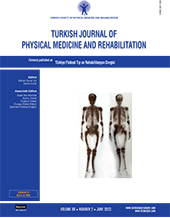Pilates-based therapeutic exercise for pregnancy-related low back and pelvic pain: A prospective, randomized, controlled trial
2 Department of Obstetrics and Gynecology, University of Health Sciences Kocaeli Derince Training and Research Hospital, Kocaeli, Türkiye
3 Department of Physical Medicine and Rehabilitation, Uşak University, Uşak, Türkiye DOI : 10.5606/tftrd.2023.11054 Objectives: In this study, we aimed to clarify the impact of a Pilates-based therapeutic exercise on disability, pain, mood, and sleep quality in patients with pregnancy-related lumbopelvic pain (LPP),
Patients and methods: In the single-blinded randomized controlled study conducted between January 2018 and June 2018, 34 pregnant women (mean age: 29.7±6.2 years; range, 18 to 40 years) in the second trimester (week 14-24) with LPP were randomly assigned to a control group and a Pilates group. All patients underwent usual prenatal care. In addition, the selected Pilates exercise was carried out twice a week for 60-min per session for 12 weeks in the Pilates group. The control group was not prescribed an exercise regimen; however, they were not discouraged from exercising. The primary outcome was disability; secondary outcomes were LPP, mood, and sleep quality. Disability [Roland-Morris Disability Questionnaire (RMDQ)], LPP [Visual Analog Scale (VAS)], mood [Hospital Anxiety and Depression Scale, Anxiety (HADS-A) and Depression (HADS-D) subscales], and sleep quality [Pittsburgh Sleep Quality Index (PSQI)] were measured before and after 12 weeks. Adverse effects and adherence were recorded to determine exercise safety and compliance. The intention-to-treat analysis was applied.
Results: The between-group effect sizes were moderate for the RMDQ and VAS scales (d=0.4 and d=0.7, respectively) and small for the HADS-A and HADS-D scales (both d=0.2). The intention-to-treat analysis demonstrated that there was a statistically significant difference in disability, pain, and mood in favor of the Pilates group (p<0.05). There was no significant difference between the two groups in terms of the PSQI (p>0.05).
Conclusion: Adding Pilates to usual prenatal care should be considered a promising treatment option for pregnancy-related LPP.
Keywords : Exercise, low back pain, lumbopelvic pain, pelvic pain, pilates, pregnancy
















